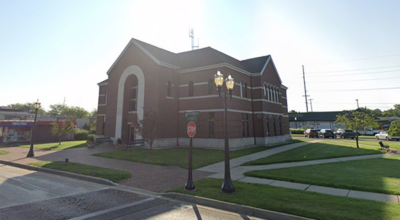Much food for thought
Published 10:38 pm Monday, May 10, 2010
By JOHN EBY
Dowagiac Daily News
After listening to their constituents’ concerns for an hour and a half Monday night, Dowagiac City Council tabled a controversial $500 utility deposit ordinance.
“Thanks for coming. Your input is very valuable,” said Second Ward Councilman Bob Schuur.
Mayor Pro Tem Leon Laylin of Third Ward added, “Your input is taken to heart, really. We’re trying to do the best we can with the information we get, so bear with us and we’ll see if we can come back and make it right for everybody. No one wants to pay the other guy’s bills. The responsibility should fall on the person who incurs the debt. That’s what we’re after. We may not have lost any money, but we didn’t collect it, either. We may eventually get part of it, but doubtful that we’ll get it all.”
“It’s much more rewarding to sit down and talk to someone who sits down and puts their name on a letter or who is willing to call my house or office and tell me who I’m talking to. Your input is invaluable. We truly do listen to it. We’re all working toward a common goal here and I deeply appreciate tonight’s comments, which were productive and civil. Really, this is a good way to run a meeting,” commented Third Ward Councilman Dr. Charles Burling.
“This is why I took the appointment,” said First Ward Councilwoman Lori Hunt, who criticized the conduct on both sides at the April 26 meeting.
“I stand by my comments, but this meeting is how council is supposed to be.”
“Thoughtful comments” were “very helpful, very civil and give us food for though,” Mayor Donald Lyons said. “I thank you for your attendance.”
Paul Potter said the city’s approach removes the risk inherent in running a utility.
Potter said the $69,000 loss the city claimed was much less than the previously stated $100,000 and for three years, 2007-2009.
Potter believes the toll to the school system would amount to much more than 10 students a month at a cost of state aid of about $7,000 per pupil.
“Not to mention foreclosures,” Potter said.
“Just the apartments. We’re all in a pretty good situation and we’re blessed with where we’re at. I love this city, but it just scares me to think of what’s going to happen. We have to go with the hand that’s been dealt to us of a bad situation in a small town. Do we want to lose how many more members of our community? Do we want to lose a person who worked for 20 years at a business that shut down. They found a job for half the money, but got their house foreclosed and now they need an apartment with half the space for their family and a $500 deposit on top of that. Cass, Decatur and Niles are close by. Let’s be realistic. They’re going to move to one of those towns. This covers you for five months in the wintertime, then you’re making a landlord pay someone else’s bill. You’re in the utility business. There’s risk. Every utility company out there in the whole country has risk involved. You’re giving yourself no risk and paying yourself no matter what. Granted, you don’t want to lose money. Nobody here wants to lose money in their business, but this is a no-lose situation. I have 15 rentals, average rent $385. Some pay $250 a month because they can’t afford any more than that. When you really break down this $100,000 you lost it’s $69,000 over three years. You broke it down a lot differently.”
The amount of $500 was said to be an “average,” with some skips amounting to as much as $3,500.
“I’m not sure this was thought out properly,” Potter said. “You can’t turn people off from November to April, so now you’re trying to throw it onto a landlord to cover. You’re trying to tell somebody that they have to pay somebody else’s debt. Would you? I’m small enough to work around whatever happens, but you’ll find a lot of people aren’t. You’re naive if you don’t think we’re going to lose a lot of people. The math is a no-lose situation for a city that took on the responsibility of being a utility. All risk is eliminated.”
Howard Hall brought out, “Technically, you haven’t had a loss yet. The figure you gave us, you can go back and put on a property owner’s property, so the figures you’re throwing out are not a loss. You’ve got to be clear and let people know ahead of time what you’re doing. You just told Mr. Potter you’ve lost whatever over the last few years, and you haven’t lost anything. You told him the dollar amounts, but you didn’t tell him you could collect on those. You’ve got to start coming forth honestly with all of the information. You’re anticipating a loss, but you haven’t had a loss yet at all and you’re guessing at what figures are needed to cover it. You’re speculating.”
Building Official Jim Bradford said about 160 signed affidavits have been brought to City Hall, including more than 90 Monday morning.
“Here’s the funny thing,” said Hall, who spoke for more than 10 minutes. “You want to target people costing you money. The way the ordinance is written right now, if landlords play the paperwork game, the only people who are going to be affected are people who get disconnected. If I’m a landlord and rent to someone, they can come in on Monday, put the utilities in their name, pay a $250 deposit, then I can come in the next day with the lease and affidavit and you’re not getting your $500. People have figured out the system.
“You’re misleading people. Why not go after the people you’re targeting who disconnect? I was told you had 80 disconnects last month. Out of 80 disconnects, some have a $250 deposit. Me, I’ve got a $50 deposit, so if I get disconnected, it costs me $450. DHS (state Department of Human Services) will only pay $200 towards a deposit on somebody’s electric bill. If a resident moves in to Dowagiac in January and DHS paid their bill, they get disconnected, DHS will not help them with that other $300 you want. Those are the people who are going to pack up and move because they can’t afford to pay their two-month bill and $300 or more for their deposit. All renters aren’t going to be treated fairly under the flawed plan you have in front of you. If you haven’t lost any money yet, let alone $100,000, you’ve got plenty of time to step back from this and come up with a new idea. Don’t panic. Take time to think about it.
“Charge them $100 to get their electric back on, like Niles. If they continually get reconnected, you’ll get your $500. I’ve called all over the state, and when you get a city-run utility on the phone and it’s $100 deposit and $100 for reconnect. A town with 5,000 people in it if we’re lucky and our utility wants a $500 deposit for new renters, they laugh. They’ve never heard of such a thing.”
Vicky James, who manages an apartment complex, said despite the recurrence of the word “landlords, this isn’t just rentals. This is foreclosures. This is closed factories. I believe ICG left owing a big electric bill. Yes, we do have the ability to collect, but at this point maybe it would be a good idea for some people – and they don’t have to be landlords, just homeowners – getting together and working out something more comparable.
“We’re trying to bring people into the town to rent. I live in the city and I see all these empty houses and they’re going to spend a half million dollars on redoing these apartments downtown. We’ve offered specials such as first month rent-free to help people move into town, but the job situation – it’s tough for young couples or students who can’t afford the dorm to pay a $500 deposit. Most of the time, if they end up leaving owing money, it’s usually far more than their deposit covers. I’ve taken a big loss in the last couple of years with the job situation. Would the council be willing to work with some people to come up with something that’s better for everybody?”






